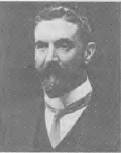- Author
- Ogle, Brian
- Subjects
- History - general
- Tags
-
- RAN Ships
- None noted.
- Publication
- June 1997 edition of the Naval Historical Review (all rights reserved)
Labour used the naval financing debates from 1901 to 1909 as a platform for the reformation of the taxation system. It was a ploy most intelligently played and in the end successful.
It is interesting that McDonald and Page were both Queenslanders. Other speakers in favour of an Australian Navy, bought and paid for with Australian funds, were Mr Paterson (Capricornia) Labour and Sir Littleton Groom (Darling Downs) Liberal, protectionist, barrister, educated University of Melbourne, devout Anglican. His family owned the Toowoomba Chronicle. Groom’s comprehensive contribution to the Naval Agreement debate included:
“I believe that reliance on a foreign power, or even upon the mother country, will degrade us”. .. “In case of war, we can keep the Empire by showing our ability to stand alone“. (Reps. Debate, p.2257).
Groom appears to have lacked the faith in the protective might of the Motherland:
“We know that a change has come over the spirit of British statesmen in regard to the colonies. No longer the tone of Empire but of:- “A sinking land, some third-rate isle half lost among her seas“. (Ibid., p.2257).
He was as utterly opposed to the Naval Agreement Bill as were the Labour Party Queenslanders.
Indications are that Queenslanders then were as anti-Imperialist control as subsequently, under Bjelke Petersen, they were anti-Canberra. Remember that in 1883 they had annexed South-East New Guinea in the face of British opposition, had raised the roof about the British Gift of the New Hebrides to France and the British acquiescence of German occupation of NW New Guinea. Despite the stubbornness of Queensland opposition the Agreement was passed and the sum of £200,000 per annum for a period of 10 years was appropriated from excise and customs revenue.
It was a pyrrhic victory for the Government. A.W. Jose (p.xxii) says: “... the prestige of the ministry was impaired; at the ensuing elections several of its candidates were defeated because of their action in voting for the new arrangement“.
On September 23, 1903, Edmund Barton, himself, resigned as Prime Minister accepting medical advice “…to diminish the excessive amount of strain which at present bears on you”. Pushing the Imperial/Admiralty barrow against strong public opinion, including that of his loyal deputy, Alfred Deakin, was a prime cause of Barton’s collapse.
In the Validation Act Appended to the Naval Agreement Bill there was inserted a clause whereby, “purely Australian naval defence forces” were to be maintained in addition to the new Imperial squadron. Such Australian forces, said the Act, ships and armament as may be approved by parliament shall be maintained by the Commonwealth and be solely under its control”. This Australian force was composed of the units previously owned by the Colonies and purchased by the new Commonwealth within the bounds of the Consolidated Revenue Act. No. 17 of 1902, wherein £787,151 was appropriated for defence.

Deakin succeeded Barton, Watson was the first Labour P.M. for a few months then Reid hoisted his pennant. These ministries were shaky and short lived. The only constant was the beavering of Queenslanders on the naval question. Sir Samuel Griffiths ex Queensland Premier and first Chief Justice of the High Court encouraged Captain Creswell, former commander of the Queensland Navy, to submit plans and costs for the establishment of a modern centralised squadron. Two million pounds sterling Creswell (now elevated to flag rank by George Reid) reckoned would buy 3 cruiser destroyers of 3,000 tons each, 16 torpedo-boat destroyers of 550 tons each and five first-class and eight second-class torpedo boats. This was 1905 and with Mr Deakin again on the bridge, Creswell was dispatched to London ostensibly to study naval developments but more likely to cool public criticism. That the demand for action, for confrontation with the Imperial government was rising, is evidenced in debates which quote Brisbane Mail, The Sydney Morning Herald and Melbourne Age editorials highly critical of shilly-shallying in the face of the Japanese victory over Russia which had completely altered the balance of power in Asia and the Pacific.
Deakin, later in the year, did voice Australian opinion by pointing out to the Imperial Government that the 1902 Agreement was not working. Speaking of the £200,000 a year paid to Admiralty, Deakin, known as the prince of compromise, dented his reputation by stating:
“No Commonwealth patriotism is aroused while we merely supply funds that disappear in the general expenditure of the Admiralty“. (Jose p.xxv).




